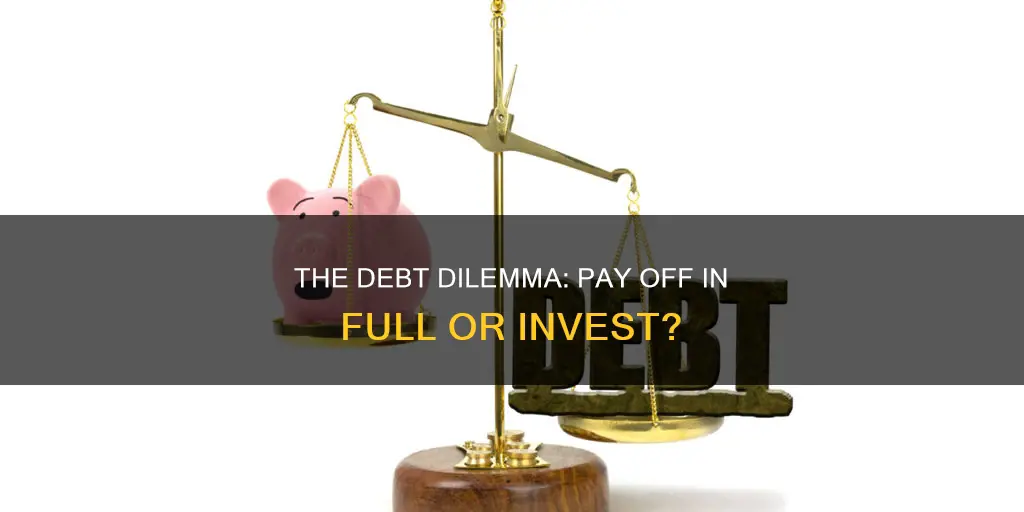
Whether to pay off debt or invest is a common dilemma, and the answer depends on your financial situation. It is generally recommended to pay off high-interest debt first, as this will save you money in the long run. However, investing early can have benefits, such as taking advantage of compound interest. It is possible to do both at the same time, and this is often the best strategy.
| Characteristics | Values |
|---|---|
| Interest rates | Compare the interest rate on your debt with the return you expect to earn on your investments, and put the money toward the option with the higher percentage figure. |
| Retirement | It is best to avoid bringing debt into retirement. |
| Credit score | Reducing debt can improve your credit score. |
| Risk tolerance | If you are comfortable taking the gamble that your investments will bob up and down with the markets, then you are a better candidate for investing than someone who would worry about what the market might do. |
What You'll Learn

Weigh up the interest on your debt against the potential returns from investing
When deciding whether to pay off debt or invest, it's important to weigh up the interest on your debt against the potential returns from investing. This involves considering the interest rate on your debt and comparing it with the expected return on your investments. If the interest rate on your debt is higher than the potential return on your investments, it is generally advisable to prioritize paying off the debt first.
For example, if you have a credit card debt with a 20% interest rate, it is advisable to focus on clearing that debt before investing, as the average stock market return of around 9.5% is significantly lower. Additionally, credit card debt can negatively impact your credit score and lead to financial difficulties if not managed effectively.
On the other hand, if you have a loan or credit card with a low-interest rate, you may choose to invest your money instead, especially if the potential investment returns are higher than the interest rate on your debt. This is because, over time, investing could lead to higher financial gains compared to simply paying off low-interest debt.
It's also worth noting that certain types of debt, such as student loan and mortgage interest, may offer tax benefits as they are tax-deductible. Therefore, carrying this type of debt while investing could be a reasonable approach, provided you can manage the associated risks.
Ultimately, the decision to pay off debt or invest depends on various factors, including interest rates, investment expectations, and your financial situation. It may be beneficial to consult a financial advisor to determine the best course of action for your specific circumstances.
Why People Invest: Unlocking Motivations
You may want to see also

Focus on paying off high-interest debt first
If you're deciding between paying off debt or investing, it's important to consider the interest rates on your debts. While it's a good idea to invest for your retirement, high-interest debt can be costly over time.
Credit card debt
Credit cards tend to have high interest rates. The average interest rate on credit cards is around 20%, with some sources citing the figure to be as high as 24.37% as of April 2024. This is significantly higher than the average rate of return for stock market investments, which is historically around 10%.
Debt resolution attorney Leslie Tayne advises that:
> "The stock market has historically returned 10% on average, while credit cards have rates that hover around 20%. Unless you aggressively pay down credit card debt first, the math won’t ever work in your favour."
Therefore, it often makes more sense to focus on clearing credit card debt as quickly as possible, rather than trying to invest at the same time.
Other high-interest debt
High-interest debt can be costly and difficult to pay off, so it's a good idea to tackle it first. As a general rule of thumb, you should prioritise paying off any debts with an interest rate of 8% or higher that lack any tax advantages.
How to pay off high-interest debt
If you have enough money to cover everything you owe, simply pay it off. If you don't, you'll need to prioritise. Start by paying off the debt with the highest interest rate first and work your way down.
You could also consider transferring your credit card balance to a card with a lower interest rate, or taking out a debt consolidation loan to combine multiple card balances at a single low rate.
The benefits of paying off high-interest debt
The sooner you eliminate debt, the less interest you will have to pay. By clearing your high-interest debt first, you could save hundreds or even thousands of dollars in interest. This will also free up cash to add to your emergency fund or kickstart your investing plan.
When to invest instead of paying off debt
If you have a loan or credit card with a low-interest rate, you may want to invest your money instead of paying off this debt. If you can earn more on your investments than your debts are costing you in interest, then investing may be the better option.
It's also worth considering the tax benefits of certain types of debt. For example, student loan interest and mortgage loan interest are often tax-deductible.
Finding a balance
While it's important to prioritise paying off high-interest debt, it's also crucial to think about your retirement. If you can, try to do both: contribute to your debt payoff, retirement, and an emergency fund. Even if that means you can only contribute a small amount to each, it's still worth doing.
If you're unsure about how to balance paying off debt and investing, consider speaking to a financial advisor. They can help you understand the best investment strategy for your situation, based on your age, risk tolerance, and overall goals.
Immaterial Labor: Why Invest?
You may want to see also

Consider the tax benefits of investing
Deciding whether to pay off debt or invest can be challenging, as both are important financial goals. However, there are several benefits to investing early and often, including the potential for compounded interest.
Another advantage of investing is the tax benefits that come with it. Student loan interest and mortgage loan interest, for example, are tax-deductible. Deductions reduce your taxable income for the year, meaning the IRS takes less of your money.
If you are carrying lower rates on credit cards or other debt balances, investing in stocks, mutual funds, or other investments could be a good idea. The money you earn by investing could outweigh the interest paid on your debt, especially if the market is performing well.
Additionally, investing in a tax-advantaged account, such as a 401(k) or IRA, can provide tax benefits that make investing more attractive than paying off debt. These accounts allow your investments to grow tax-free or tax-deferred, further increasing your returns.
Before deciding whether to pay off debt or invest, it is essential to consider your financial situation, risk tolerance, and the interest rates on your debt. It may be beneficial to consult a financial advisor to determine the best course of action for your specific circumstances.
Investing: Good or Bad Idea?
You may want to see also

Assess your risk tolerance
When deciding whether to pay off debt or invest, it's important to assess your risk tolerance. This will help determine the level and type of investment risk you can handle and guide your investment strategy. Here are some key considerations to assess your risk tolerance:
- Use a Risk Tolerance Questionnaire: Complete a risk tolerance questionnaire to evaluate your comfort level with investment risk. These questionnaires can be obtained from professional organizations or financial services companies and typically cover areas such as financial status, investment objectives, and attitudes towards risk.
- Identify Your Goals: Consider whether your financial goals are short-term or long-term. For example, someone saving for a house down payment may have a lower risk tolerance than someone investing for retirement.
- Determine Your Time Horizon: Time horizon refers to the anticipated duration you are willing to hold an investment before liquidating it for a specific goal. A longer time horizon generally allows for a higher tolerance for risk, as you have more time to recover from potential losses.
- Behavioural Biases: Reflect on how you have responded to market changes in the past. For instance, did you sell off investments in a panic during market turmoil, or did you double down? Understanding your behavioural biases, such as loss aversion or overconfidence, can help you assess your risk tolerance.
- Evaluate Your Capacity for Risk: Assess your risk capacity by considering your family situation and financial status, including net worth, income stability, and future obligations. This will help determine the level of financial risk you can afford to take.
- Understand the Risk-Return Tradeoff: Educate yourself about the risk-return tradeoff, which states that potential returns generally increase with higher risk. Low-risk investments usually yield low returns, while high-risk investments offer higher potential returns.
- Document Your Risk Discussions: Keep records of your conversations and reflections on risk tolerance. Maintain detailed notes, use standardized forms, and regularly update your risk profile to reflect any changes.
- Regularly Review Your Risk Tolerance: Your risk tolerance is not static and can change over time due to factors such as age, economic cycles, current events, or personal circumstances. Therefore, it's essential to review your risk tolerance periodically to ensure your financial plan and investments remain aligned with your risk profile.
Why Invest in Entertainment?
You may want to see also

Take your feelings into account
When deciding whether to pay off debt or invest, it's important to take your feelings into account. While the numbers might suggest one option is more financially beneficial, it's also crucial to consider your emotional and mental well-being.
Debt can be a significant source of stress and anxiety, affecting your sleep and overall peace of mind. Carrying debt, especially high-interest credit card debt, can feel like a heavy burden. The longer you wait to pay it off, the more interest charges you'll rack up, and the longer you'll carry that weight.
If the thought of having debt keeps you up at night, it's perfectly valid to prioritize paying it off sooner rather than later. By doing so, you'll free yourself from the stress and mental toll of debt and improve your overall financial situation.
Additionally, consider your risk tolerance. Investing in the stock market or other volatile assets might offer higher potential returns, but it also comes with inherent risks. If the idea of your investments fluctuating with the market causes you anxiety, it might not be the best choice for you.
On the other hand, investing early and often has its advantages, mainly due to the power of compounding interest. The earlier you start investing, the more time your money has to grow. However, this approach also requires a certain level of comfort with risk and market volatility.
Ultimately, the decision to pay off debt or invest depends on various factors, including your financial situation, interest rates, and investment opportunities. However, don't underestimate the importance of your feelings and emotional well-being in the equation. Sometimes, the peace of mind that comes with being debt-free is priceless.
Cruise Lines: Worth the Investment Risk?
You may want to see also
Frequently asked questions
This depends on the interest rate of your debt. If you have high-interest debt, such as credit card debt, it is generally recommended to pay this off first. However, if you have a low-interest loan, such as a student loan or mortgage, you may want to invest your money instead, as you are likely to earn more on your investments than your debts are costing you in interest.
The sooner you eliminate debt, the less interest you will have to pay. Paying off debt can also improve your credit score, which is important if you want to borrow money in the future. Additionally, being able to escape debt payments can take a weight off your shoulders, improving your mental health.
One of the main benefits of investing early is compounding interest. The younger you are when you start investing, the more time your money has to grow. Another benefit is the tax advantages of certain investments. For example, student loan interest and mortgage loan interest are tax-deductible.







